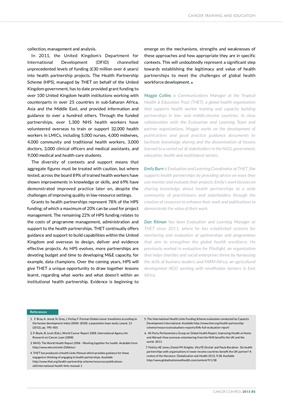
CANCER TRAINING AND EDUCATION
CANCER CONTROL 2015 85
References
1. F. Bray, A. Jemal, N. Grey, J. Ferlay, F. Forman Global cancer transitions according to
the human development index (2008-2030): a population-base study. Lancet, 13
(2012), pp. 790-801
2. P. Boyle, B. Levin (Eds.), World Cancer Report 2008. International Agency for
Research on Cancer, Lyon (2008)
3. WHO. The World Health Report 2006 - Working together for health. Available from:
http://www.who.int/whr/2006/en/
4. THET has produced a Health Links Manual which provides guidance for those
engaged or thinking of engaging in health partnerships. Available
http://www.thet.org/health-partnership-scheme/resources/publicationsold/international-health-links-manual-1
5. The International Health Links Funding Scheme evaluation conducted by Capacity
Development International. Available http://www.thet.org/health-partnershipscheme/resources/evaluations-reports/ihlfs-full-evaluation-report
6. All-Party Parliamentary Group on Global Health Report. Improving Health at Home
and Abroad: How overseas volunteering from the NHS benefits the UK and the
world. 2013
7. Felicity AE Jones, Daniel PH Knights, Vita FE Sinclair and Paula Baraitser. Do health
partnerships with organisations in lower income countries benefit the UK partner? A
review of the literature. Globalization and Health 2013, 9:38. Available
http://www.globalizationandhealth.com/content/9/1/38
collection, management and analysis.
In 2011, the United Kingdom's Department for
International Development (DFID) channelled
unprecedented levels of funding (£30 million over 6 years)
into health partnership projects. The Health Partnership
Scheme (HPS), managed by THET on behalf of the United
Kingdom government, has to date provided grant funding to
over 100 United Kingdom health institutions working with
counterparts in over 25 countries in sub-Saharan Africa,
Asia and the Middle East, and provided information and
guidance to over a hundred others. Through the funded
partnerships, over 1,300 NHS health workers have
volunteered overseas to train or support 32,000 health
workers in LMICs, including 5,000 nurses, 4,000 midwives,
4,000 community and traditional health workers, 3,000
doctors, 3,000 clinical officers and medical assistants, and
9,000 medical and health-care students.
The diversity of contexts and support means that
aggregate figures must be treated with caution, but where
tested, across the board 89% of trained health workers have
shown improvements in knowledge or skills, and 69% have
demonstrated improved practice later on, despite the
challenges of improving quality in low-resource settings.
Grants to health partnerships represent 78% of the HPS
funding; of which a maximum of 20% can be used for project
management. The remaining 22% of HPS funding relates to
the costs of programme management, administration and
support to the health partnerships. THET continually offers
guidance and support to build capabilities within the United
Kingdom and overseas to design, deliver and evidence
effective projects. As HPS evolves, more partnerships are
devoting budget and time to developing M&E capacity, for
example, data champions. Over the coming years, HPS will
give THET a unique opportunity to draw together lessons
learnt, regarding what works and what doesn't within an
institutional health partnership. Evidence is beginning to
emerge on the mechanisms, strengths and weaknesses of
these approaches and how appropriate they are in specific
contexts. This will undoubtedly represent a significant step
towards establishing the legitimacy and value of health
partnerships to meet the challenges of global health
workforce development. l
Maggie Collins is Communications Manager at the Tropical
Health & Education Trust (THET), a global health organization
that supports health worker training and capacity building
partnerships in low- and middle-income countries. In close
collaboration with the Evaluation and Learning Team and
partner organizations, Maggie works on the development of
publications and good practice guidance documents to
facilitate knowledge sharing and the dissemination of lessons
learned to a varied set of stakeholders in the NGO, government,
education, health and multilateral sectors.
Emily Burn is Evaluation and Learning Coordinator at THET. She
supports health partnerships by providing advice on ways they
can monitor and evaluate their projects. Emily's work focuses on
sharing knowledge about health partnerships to a wide
community of practitioners and stakeholders through the
creation of resources to enhance their work and publications to
demonstrate the value of their work.
Dan Ritman has been Evaluation and Learning Manager at
THET since 2011, where he has established systems for
monitoring and evaluation of partnerships and programmes
that aim to strengthen the global health workforce. He
previously worked in evaluation for Pilotlight, an organization
that helps charities and social enterprises thrive by harnessing
the skills of business leaders; and FARM-Africa, an agricultural
development NGO working with smallholder farmers in East
Africa.